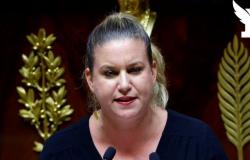THE ESSENTIAL
- An awareness campaign on the daily life of caregivers is organized during the month of October.
- Stéphanie, who accompanies her father suffering from prostate cancer, insists on the importance of dialogue between the caregiver and the patient.
- According to her, the important thing for a caregiver is to explain the situation to the patient while avoiding the fear linked to cancer.
Despite the experience of illness that her job as a nurse gave her, Stéphanie will undoubtedly never forget the moment when she learned that her father had prostate cancer. “Everything is falling apart, you think ‘what’s going to happen, is he going to die soon’, when it comes to a parent you have all your childhood that parades… “.
In Stéphanie’s case, this announcement of her father’s cancer has indeed almost become a family affair. “Dad is 76 years old, mom is 70 years old, faced with people of that age, it’s not easy to explain things, I had to move from my nursing vocabulary to that used by a girl in front of his parents”.
Explaining and managing the fear of cancer
The choice of words: this is one of the challenges shared by caregivers. We must explain but we must also spare the fear caused by the terms linked to cancer. “Just when we are referred to a specialist, when we hear the word oncologist, we know that what happens next is not going to be nice…”.
And everything becomes even more complicated when it comes to supporting a parent, especially when you are a girl and the disease concerns your dad’s male organs. “I asked myself a lot of questions to know how I could approach things without making him uncomfortable, the penis, the prostate, I was very embarrassed to talk about it with my dad but at the same time I had to so that I can fulfill my role as a caregiver”explains Stéphanie who finally decided: “I caught him between four eyes by telling him ‘I am your daughter but I am also a nurse’”.
@pourquoidocteur Since the announcement of her father’s prostate cancer, Stéphanie has become a devoted caregiver. In collaboration with Novartis, discover his inspiring testimony. ???????? #CaregiverDay #ProstateCancer #EverydayHeroes ♬ original sound – whydoctor
Calm, patience and listening
Far from being a problem, the exchange allowed the whole family to better understand the situation. And even beyond: “It changed our relationships, I am today much closer to him, his outlook has changed towards me, and also closer to my mother who realized that she could also count on me in any circumstance”remarks Stéphanie. To the point that she allows herself today to say about the prostate cancer from which her father suffers: “Of course it’s an illness, but it’s been wonderful for us!”
Certainly, but before this happy observation Stéphanie still had to take it upon herself to ensure that her father’s support was not disrupted by the affect that comes into play when it comes to a parent. His recipe for achieving this can be summed up in three words. First of all, the calm that must be maintained so as not to panic when faced with the news of an illness. “for which there are solutions, treatments that work”. Then patience “faced with all the stages that we will have to face”. And finally listening and even more than that of the patient, that of the doctors “to whom you should not hesitate to ask all the questions because it is important for a caregiver to understand things well and to integrate them well”.






